Coronavirus: Alcohol-only pubs reopen in Northern Ireland
- Published
- comments
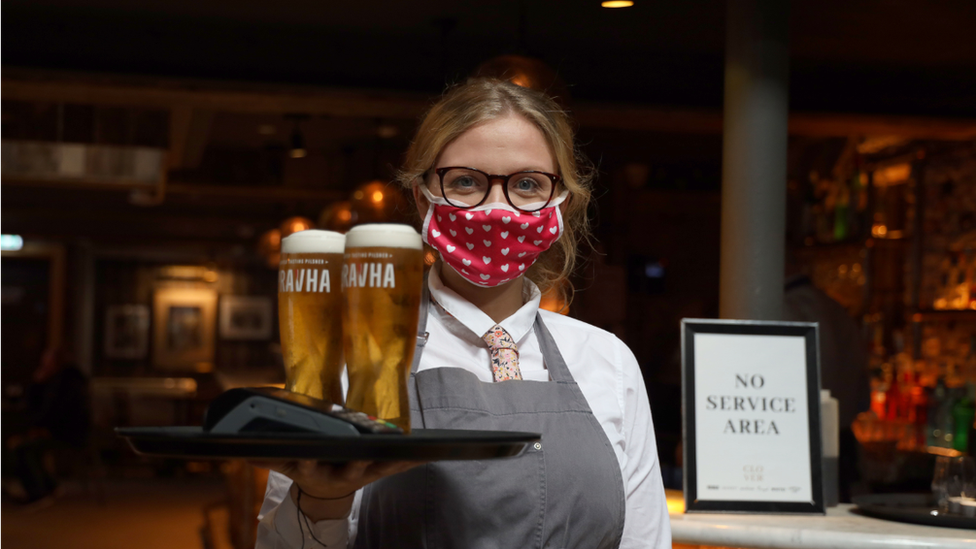
The reopening date for pubs had been pushed back twice due to a rising number of coronavirus cases
About 600 drink-only bars in Northern Ireland can reopen their doors for the first time since March.
It had previously been the case that pubs could only sell alcohol if they also served food or if customers were outside.
The reopening date for pubs had been pushed back twice due to a rising number of coronavirus cases.
However, the executive could impose an earlier closing time.
From Thursday in England and Wales, pubs, bars and restaurants must close at 22:00 BST.
This also takes effect in Scotland from Friday, while in the Republic of Ireland, drink-only pubs have a 23:30 curfew.
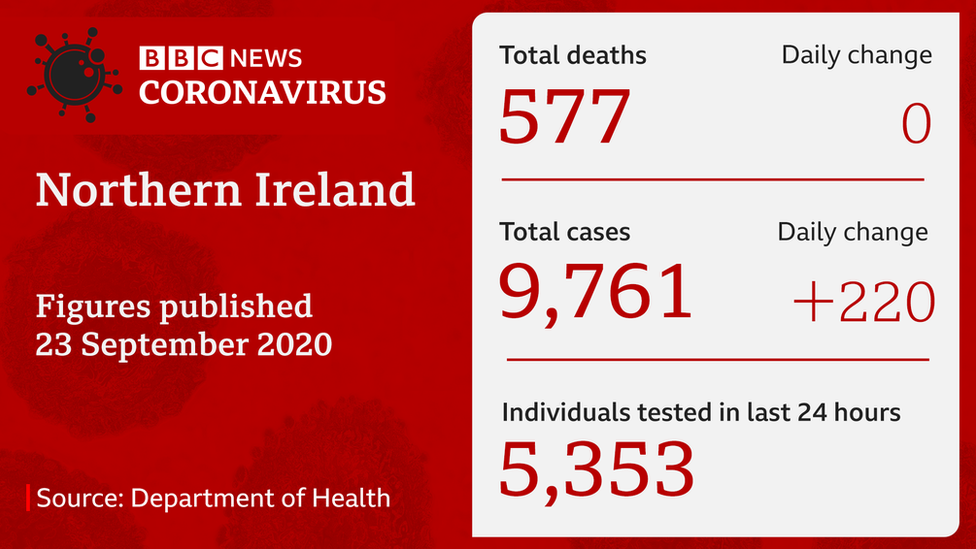
The latest Department of Health statistics show there have been no further coronavirus-related deaths and 220 more positive cases. The death toll remains at 577.
The dashboard, external also shows 41 people are in hospital with Covid-19, six in intensive care units.
Two deaths were recorded in the Republic of Ireland and 234 new cases of coronavirus were reported in the past 24 hours.
House parties
On Thursday, First Minister Arlene Foster said the executive did not want to impose restrictions that would "displace people from a pub into a house party".
Speaking on a visit to a school in Dungannon, County Tyrone, she said said it was important ministers listened to "medical advice" on the issue.
"One of the concerns we have is if people leave at a certain time, will they go home or will they get more alcohol and go to a house party?
"We need to have a discussion around all of those things so we're not displacing people from a pub into a house party."
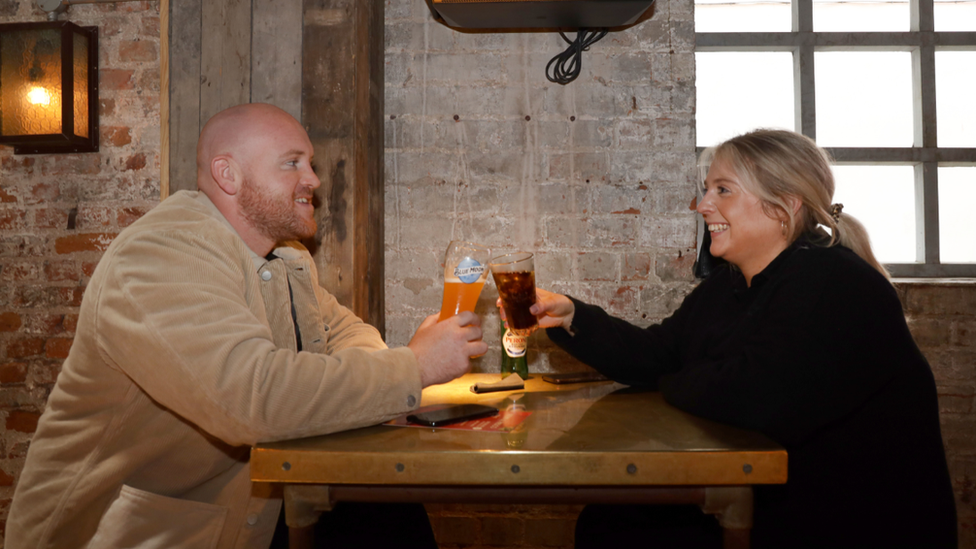
From Thursday in England and Wales, pubs, bars and restaurants must close at 22:00 BST
Mrs Foster also said work was ongoing within the executive to encourage university students, where possible, not to travel home at weekends.
"We are asking them to exercise discretion," said the first minister.
"If they don't need to go home, can they stay in their university environment?
Wedding numbers
"We haven't put any definitive piece on this yet, but we want to make sure if we get to the situation where we're asking students to stay in university accommodation, that there's support there for them, if they need to stay."
Mrs Foster was also asked about the possibility of the executive limiting the number of people allowed to attend weddings.
In England, Prime Minister Boris Johnson has announced that maximum number of guests would be reduced to 15.
Currently in NI, there is no overall limit on the number of guests that can attend, external so long as the venue has carried out an individual risk assessment to determine how many people it can safely hold.
But the first minister said there are "no plans to have any discussions on wedding numbers at this moment in time".
BBC News NI's Jordan Kenny explains the latest Covid-19 restrictions
Earlier, the executive's chief scientific adviser, Prof Ian Young, said that the evidence showed that most cases of the virus are being acquired in households "or through informal interactions between households" rather than in settings such as shops and restaurants.
"There is some risk associated with virus transmission in pubs - that's unavoidable - there will be some very strict mitigations in place which the sector will have to follow and I hope strong enforcement for anyone who is not following those mitigations," he told Good Morning Ulster.
"A curfew would have some effect in terms of reducing transmission, we have to think very carefully about the economic consequences of that.
"In all of this the executive have to weigh up economic and social consequences against health consequences when considering the best decision to make."
He added: "We have to at least be aware of what closing hours might be in the Republic of Ireland, because we don't want to encourage unnecessary movements across the border which will again just give a risk of brining the virus both ways."
Hospitality industry representatives have said further restrictions may mean that many businesses will no longer be viable.
Both Hospitality Ulster and the Northern Ireland Hotels Federation (NIHF) have called for the executive to align its policy on closing times with the Republic of Ireland.
NIHF said staggered bookings and additional cleaning time means many businesses may struggle to survive if they have to shut early.
Colin Neill, chief executive of Hospitality Ulster, said "to avoid confusion and for parity" there should be the same rule across the border.
"The past six months have been incredibly challenging for those in the hospitality sector and it seems that it is going to get even more challenging," he added.
Michael Cafolla, from the Institute of Hospitality NI, said they would be "very disappointed" by a 22:00 curfew.
"I think we need to be aligned with the Republic and their 23:30 closing time because of the proximity with the border towns first of all," he said.
"But also the 22:00 closing will make many of our businesses not viable."

What will pubs have to do?
The executive has agreed that the mandatory requirements for pubs opening will include:
Table service only - no standing and no bar service
Dancing will be banned in hospitality venues
A maximum of six people from any number of households can be seated at a table. Children under 12 will not be included in the total
More than six people will be permitted if they all belong to a single household
The venue will be required to collect customer details to assist with contact tracing
Face coverings should be worn to enter and leave the venue and for movement inside. They are not required once seated.

Covid-19 restrictions were extended to all of Northern Ireland from 18:00 BST on Tuesday, and the Northern Ireland Executive is to meet on Thursday to consider further measures.
The new rules specify there will be no mixing of households indoors with the following exceptions:
Bubbling with one other household
A limit of six people from no more than two households, excluding children aged 12 or under, can gather in a private garden
Caring responsibilities including childcare
Essential maintenance
Supported living arrangements
Visits required for legal or medical purposes
Marriage or civil partnerships where one partner is terminally ill
- Published29 July 2021

- Published22 September 2020
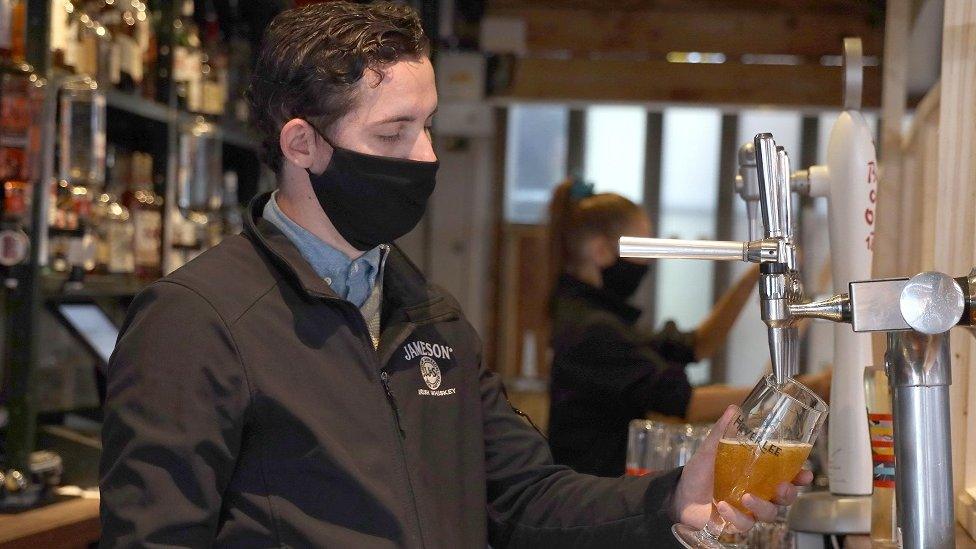
- Published17 September 2020
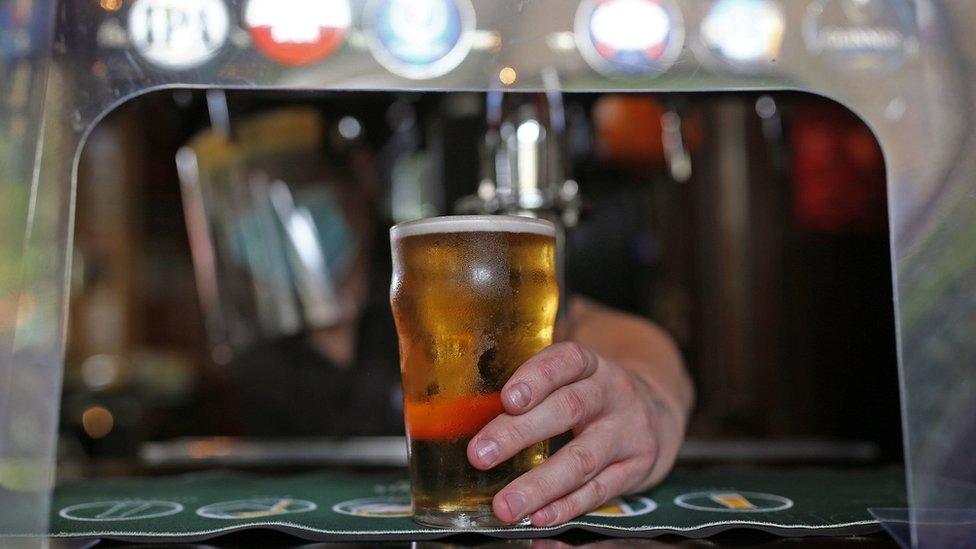
- Published22 September 2020
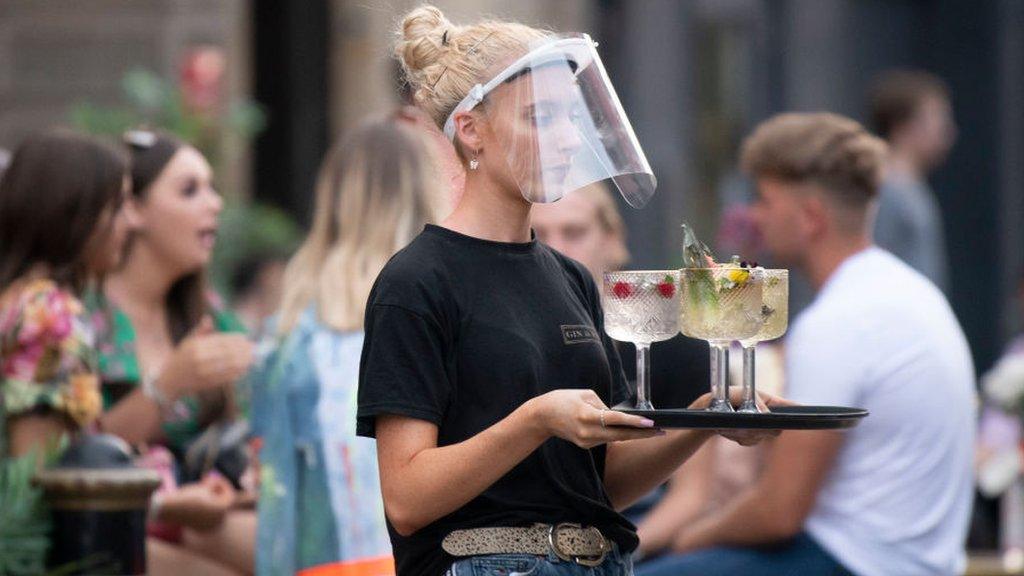
- Published22 September 2020
